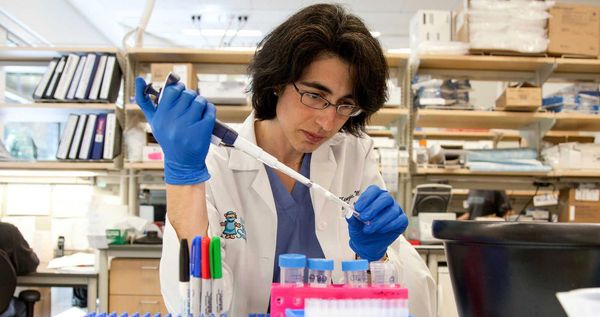Introduction
See also our conditions page on Alpha Thalassemia
Contact the study team: fetaltreatmentcenter@ucsf.edu or 1-800-RX-FETUS
Early diagnosis and treatment of a pregnancy affected by Alpha Thalassemia Major (ATM) are critical for the survival of the fetus and the health of the mother. Currently, the only treatment to allow a fetus with ATM to survive to birth is in utero transfusion (IUT) of red blood cells to treat fetal anemia and avoid the complications of hydrops. A child born with ATM will require lifelong blood transfusions monthly or a bone marrow transplant. In utero stem cell transplantation was developed as a strategy to address the challenges associated with postnatal transplantation.
In this FDA-approved phase 1 clinical trial, we transplant stem cells from the mother to the affected fetus at the same time as a planned IUT. Performing the stem cell transplantation at the same time as IUT minimizes additional procedural risk to the fetus and takes advantage of a unique time period in development when the mother can be an ideal stem cell donor for her fetus. We are testing whether this added in utero transplantation is safe and effective for patients with ATM.
Two patients have been transplanted in this clinical trial, and both are thriving toddlers. These videos tell the story of the first patient, Elianna.
PART 1: Tippi and Elianna's Story: Stopping a Fatal Blood Disease Before Birth
PART 2: Tippi, Elliott and Elianna’s Story: Little Girl Thrives After Fetal Stem Cell Transplant
Overview
The immune system of a developing fetus has unique features that make stem cell transplant safer before birth than after birth. This is particularly true when it is the mother’s stem cells are transplanted into the fetus because the mother and fetus tolerate the presence of other’s cells during pregnancy (maternal-fetal tolerance). When transplanted in utero, the developing fetal immune system will tolerate the transplanted cells without conditioning or immunosuppression.
Mothers who choose to participate in this clinical trial will have stem cells harvested from their bone marrow. These cells will then be prepared for safe injection and transplanted into the fetus at the same time as an IUT. The fetus will have additional blood transfusions until birth.
The success of the transplant will be evaluated after birth. If the transplant is successful and the mother’s stem cells are “engrafted” (incorporated into the baby’s own bone marrow), the baby will be able to make normal blood cells. If the transplantation is not fully successful and engraftment is weaker, a “booster” transplant of the mother’s stem cells may be performed after delivery. Since even low engraftment could result in long lasting tolerance to the mother’s cells, this booster transplant can improve the baby's ability to make normal blood cells. A booster transplant from the mother is expected to be safer than current methods of stem cell transplantation after birth.
While we believe in utero transplantation can be performed safely, it is possible that it may not be effective. Potential risks of the procedure are that the fetus may become sick after the in utero transplantation or may not survive the therapy. Additionally, the mother may need a blood transfusion after donating bone marrow. In the event that in utero transplantation is not successful, blood transfusions will continue after birth and stem cell transplantation may be considered.
For more information about this clinical trial or to refer a patient, please call 1-800-RX-FETUS (1-800-793-3887) or email us at fetaltreatmentcenter@ucsf.edu.
Educational Information
- Treatment Options for Pregnancy with ATM (for patients) — Treatment Options in English, Treatment Options in Tagalog, Treatment Options in Thai, Treatment Options in Traditional Chinese, Treatment Options in Vietnamese
- Fetal Intervention for ATM (for patients) — trifold Fetal Intervention (for patients) in English
- Fetal Intervention for ATM (for providers) — trifold Fetal Intervention (for providers) in English, Fetal Intervention (for providers) in Tagalog, Fetal Intervention (for providers) in Thai, Fetal Intervention (for providers) in Traditional Chinese, Fetal Intervention (for providers) in Vietnamese
- Prenatal Screening & Diagnosis Algorithm for Thalassemia
- Favorable outcomes after in utero transfusion in fetuses with alpha thalassemia major: a case series and review of the literature Kreger EM, Singer ST, Witt RG, Sweeters N, Lianoglou B, Lal A, Mackenzie TC, Vichinsky E. Prenat Diagn. 2016 Dec; 36(13):1242-1249.
International Registry
Clinical Trail Info
ClinicalTrials.gov Identifier: NCT02986698
Principal Investigator: Tippi C. MacKenzie, MD
Sponsors: This study is funded by the California Institute for Regenerative Medicine (CIRM) and the UCSF Center for Maternal-Fetal Precision Medicine
